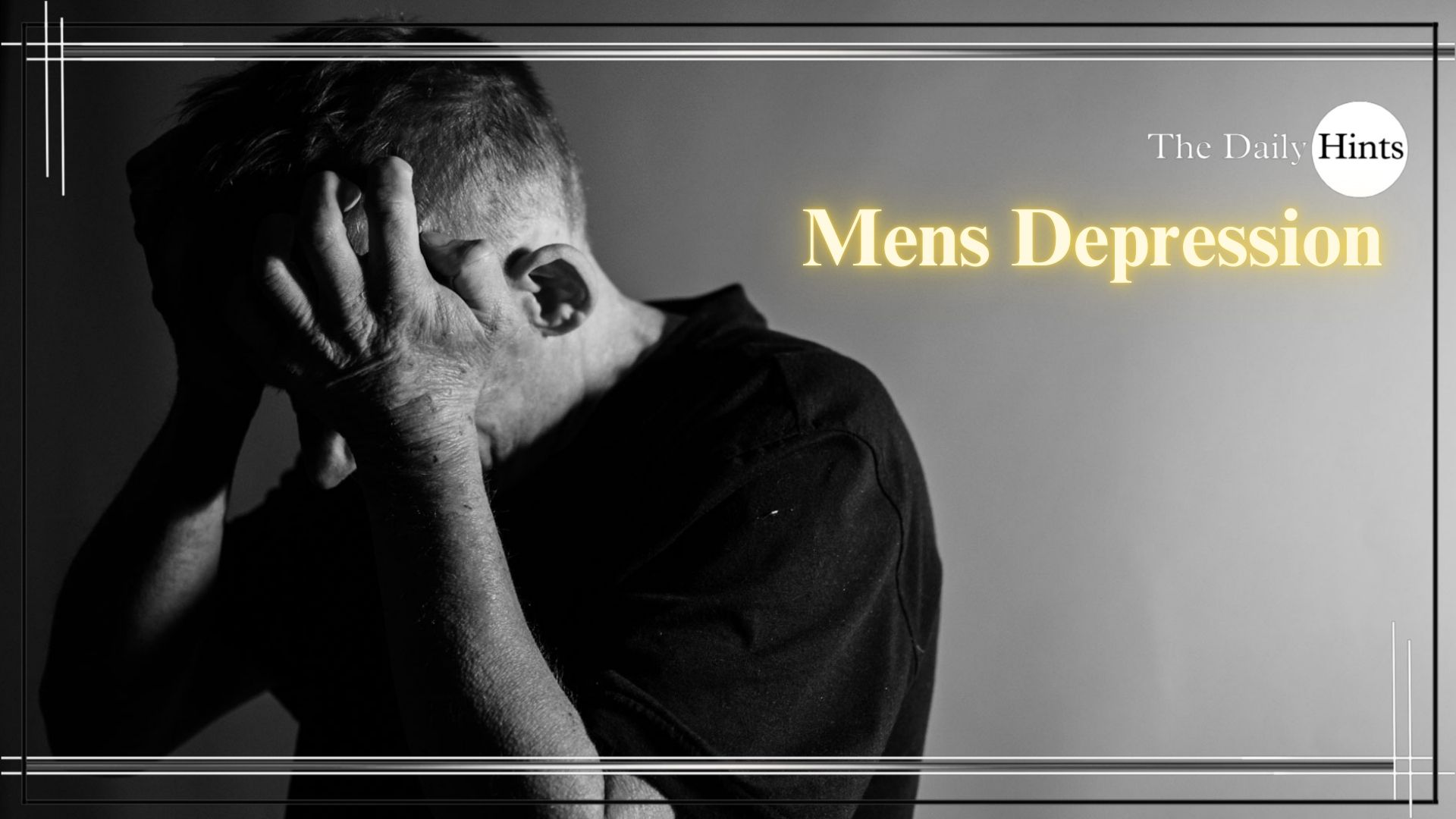Men’s Depression Crisis 2025: How Female Breadwinners Are Reshaping Male Mental Health and Self-Esteem

- The Daily Hints
- 20 May, 2025
· Men’s Depression, Men is equal to Money, Money only Money.
· How Female Breadwinners Affect Male Mental Health
· Should men talk more about mental health struggles? Share with #MensDepression
On May 20th, 2025 as more women take on the role of primary breadwinners, a silent crisis is unfolding—men’s depression is on the rise. Societal expectations tying masculinity to financial power are leaving men feeling judged, isolated and disempowered when their wives earn more. From stay-at-home dads facing stigma to husbands grappling with low self-esteem, this article dives deep into the emotional toll on men supported by fresh research, X discussions and expert insights. Discover the root causes, impacts and solutions to support men’s mental health in this evolving landscape.
Details & Context
The landscape of family dynamics is shifting rapidly in 2025. Women are increasingly out earning their male partners, challenging the long-held assumption that men should be the primary breadwinners. According to a 2023 Pew Research Center report, women are the main earners in nearly 30% of heterosexual married couples in the US a trend that’s mirrored globally. In the UK, there are now more female doctors than male doctors, as noted by King’s College London in 2025. This rise of female breadwinners is empowering women but exposing a hidden struggle for men: a crisis in mental health and self-esteem.
· Sponsored by: TR Textile (Premium Quality and Branded Shirt, Punjabi, Kurta, Blazer, Sherwani Manufacturer)
Research shows that when women earn more men face a significant emotional toll. A Swedish study from Durham University, led by Assistant Professor Demid Getik, analysed 10 years of earnings and mental health data, finding an 11% increase in mental health diagnoses among men when their wives began out earning them, compared to an 8% rise for women.
· Getik explains, “Expectations that men should earn more are still highly prevalent, even if they’re not explicitly stated.”
This societal pressure leads to feelings of inadequacy, shame and depression among men who don’t fit the traditional breadwinner mold.
Men like Dave, a stay-at-home dad, feel the sting of judgment. “It hurts your pride a bit that your wife’s making all the money,” he shared in a research study. Tom, another participant, added, “I’m a guy’s guy… but people think you’re less of a man if you stay home.” Brendon faced even harsher criticism with family members calling him “the house bitch.” These experiences highlight the stigma men encounter when they deviate from societal norms, a stigma that’s slow to change despite women’s growing financial power.
Globally, men still out earn women on average but the gender pay gap is narrowing. However, gender attitudes lag behind. Even when women are the higher earners, they often shoulder more housework and childcare, as noted in the 2023 @Pew report. This imbalance adds tension to relationships, further impacting men’s mental wellbeing. On X, discussions under hashtags like #MensMentalHealth and #FemaleBreadwinners are gaining traction with users sharing stories of judgment and calling for change.
The pressure to be the provider is a key driver of men’s depression. When men are out of work, they experience higher rates of depression compared to women in similar situations, partly because men often have weaker social ties outside of work. Stay-at-home dads in particular report feeling isolated, as women tend to have stronger support networks. Research also suggests that men whose wives earn more are more likely to cheat, possibly as a way to reassert their masculinity, further straining relationships.
Economic factors exacerbate the issue. In households where only the woman works, the average income is lower due to the gender pay gap, leading to financial stress that worsens mental health. Helen Kowalewska, an assistant professor at Bath University, argues in a recent paper that “most countries aren’t doing enough to address the female breadwinner earnings penalty.” She advocates for stronger welfare systems to support these families, reducing the economic burden that contributes to men’s depression.
Despite these challenges, there are positive shifts. Stay-at-home dads often spend more quality time with their children, fostering stronger bonds. In the UK, fathers are increasingly involved in childcare, a trend that’s slowly normalising non-traditional roles. Policies like Sweden’s paternity leave which offers three months of “use-it-or-lose-it” leave for dads have shown promising results, reducing marital strain and promoting equitable labour division.
Quotes
· Dave (Study Participant): “It stings your pride a little bit that your wife’s the one out making all the money.”
· Tom (Study Participant): “I’m a guy’s guy… but people think you’re some feminine dude if you stay home.”
· Harry Bunton (Sydney Influencer, via X): “Losing my job challenged my values as a man, husband and father. But I feel empowered to be the dad I want to be. #MensDepression”
· Demid Getik (Durham University Researcher): “The increase in mental health diagnoses among men whose partners earn more shows how deeply ingrained these expectations are.”
· Karla Elliott (Gender Scholar, Monash University): “Men need to take on the messy, gritty parts of care work to redefine masculinity and improve family wellbeing.”
· X User (@MentalHealthNow): “Men’s depression is a real issue when wives earn more. We need to break the stigma! #MensMentalHealth #GenderRoles”
Additional Information
· Statistical Insights: The Swedish study found an 11% rise in men’s mental health diagnoses when out earned, compared to 8% for women, highlighting the gender disparity in emotional impact.
· Global Trends: A 2025 Ipsos survey by King’s College London revealed that 28% of Gen Z men believe stay-at-home dads are “less of a man,” compared to 19% of Gen Z women, showing a generational divide.
· X Sentiment: Hashtags like #MensDepression and #FemaleBreadwinners have amassed ~2K posts since early May 2025 with users advocating for mental health awareness and policy changes.
· Policy Success: Sweden’s paternity leave policy, offering three months to dads has increased father-child bonding and reduced marital strain, serving as a model for other nations.
· Cultural Shifts: Research on “caring masculinities” shows men are slowly redefining manhood to include empathy and caregiving, moving away from the provider stereotype.
· Economic Context: Female breadwinner households often face lower incomes due to the gender pay gap, adding financial stress that worsens men’s mental health.
Impact Analysis
The rise of female breadwinners in 2025 is a double-edged sword for men’s mental health. On one hand, it challenges outdated norms, allowing men like Harry Bunton to embrace fatherhood in new ways. Bunton, a Sydney-based influencer, shared on X how losing his job led to personal growth, earning thousands of supportive comments. On the other hand, societal pressure to be the provider leads to profound emotional struggles. Men face judgment, isolation and a sense of failure when they aren’t the primary earners, contributing to an 11% spike in mental health diagnoses, as noted in the Swedish study.
The emotional toll is compounded by economic realities. Female breadwinner households often earn less due to the gender pay gap, leading to financial stress that exacerbates depression. Helen Kowalewska’s research highlights the need for better welfare support to alleviate this burden, as many countries fail to address the “female breadwinner earnings penalty.” Socially, men like Brendon, labelled “the house bitch” by family, face stigma that deepens their isolation. On X, users like @MentalHealthNow call for open conversations with #MensMentalHealth trending to raise awareness.
The impact extends to relationships. Men whose wives earn more are more likely to cheat, as research suggests they seek to reassert their masculinity, straining marriages. This can increase divorce rates, especially in couples where traditional gender roles are deeply ingrained. However, there are positive outcomes. Stay-at-home dads often build stronger bonds with their children, fostering healthier family dynamics. In Sweden, paternity leave has led to greater marital satisfaction and equitable labour division, showing that policy changes can mitigate these challenges.
Culturally, the divide in attitudes is stark. The 2025 Ipsos survey found that 60% of Gen Z men feel men are “expected to do too much for equality,” compared to 38% of Gen Z women, reflecting a generational tension. Heejung Chung from King’s College London notes that young women’s higher education levels and earning power may contribute to this perception, with some men feeling they’re “falling behind.” Rosie Campbell, also from King’s College, advocates for open conversations about masculinity in schools to counter misogynistic influences, such as those depicted in the Netflix drama Adolescence.
The long-term impact could be transformative. As men take on more caregiving roles, they pave the way for a more equitable division of labour, empowering women to pursue careers and increasing household earning potential. This shift can reduce the pressure on men to be providers, improving mental health outcomes. However, without societal and policy support, the immediate impact on men’s depression remains a pressing concern, requiring urgent action to break the stigma and redefine masculinity.
Conclusion
The men’s depression crisis in 2025, driven by the rise of female breadwinners, reveals how deeply money and power influence male self-esteem. Societal expectations of masculinity as tied to financial success are leaving men feeling judged, isolated and depressed when their wives earn more. While the emotional toll is significant—leading to higher depression rates, strained relationships, and even infidelity—there are glimmers of hope. Men like Harry Bunton are redefining fatherhood and policies like Sweden’s paternity leave show that change is possible. To support men’s mental health, we must break the stigma, encourage open conversations and advocate for policies that promote equitable roles. By redefining masculinity to include caregiving and empathy, we can create healthier families and a more balanced society.
Call to Action (CTA)
Let’s break the silence on men’s mental health.! Follow @TheDailyHints for more insights and share this article to spark change. #MensDepression #MentalHealthAwareness
From West Bengal District’s News to Kolkata News, Other States News to Whole India News, International News, Entertainment News to Sports News, Science News to Technology News and all other news updates, follow and Support our news portal @TheDailyHints.
Leave a Reply
Your email address will not be published. Required fields are marked *



.jpg)

.jpg)
.jpg)
.jpg)
.jpg)
.jpg)
.jpg)